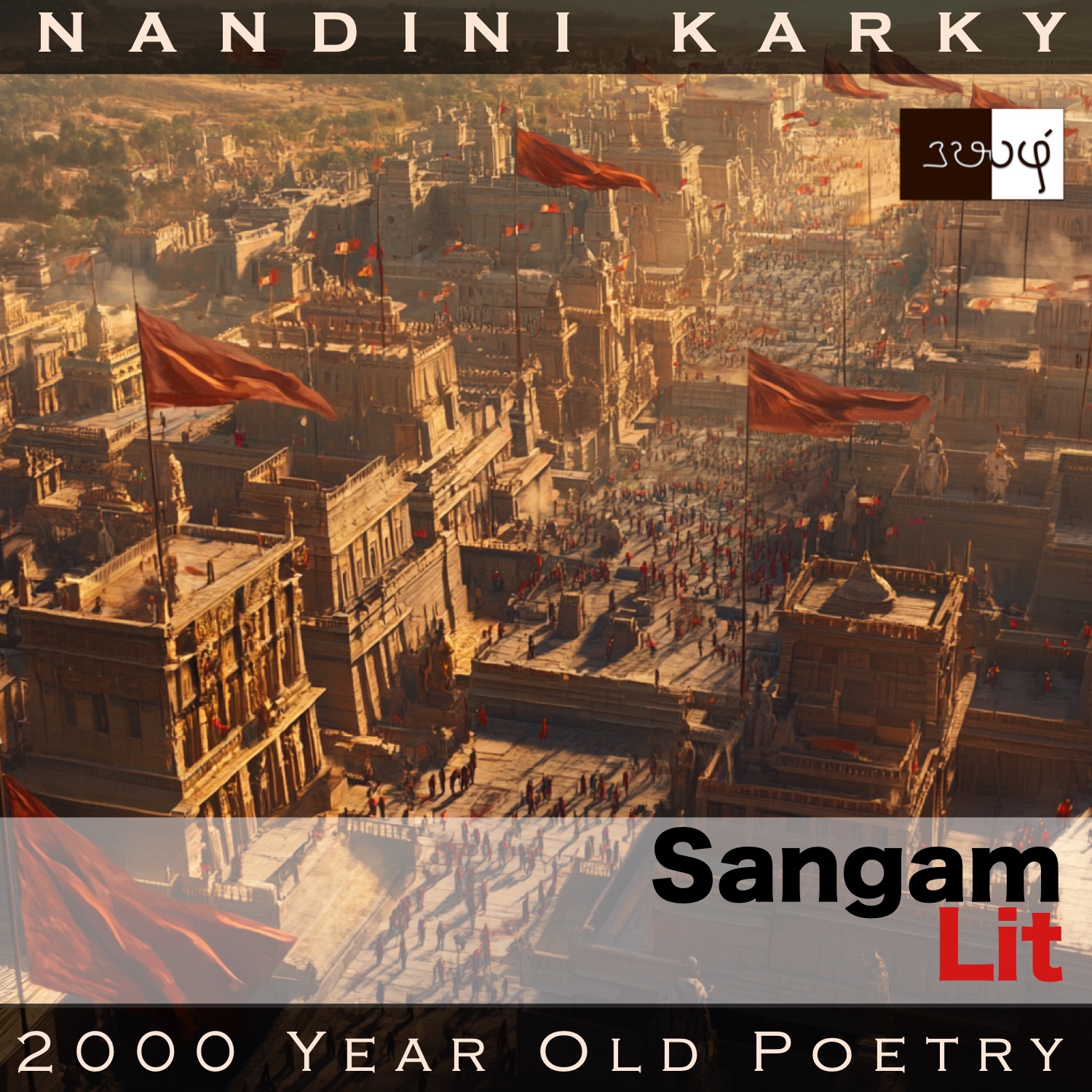Podcast: Play in new window | Download
Subscribe: Apple Podcasts | Spotify | Amazon Music | Android | iHeartRadio | TuneIn | RSS | More
In this episode, we perceive a poignant question and its resounding response, as depicted in Sangam Literary work, Kalithogai 31, penned by the Chera King Paalai Paadiya Perunkadunko. The verse is situated in the ‘Paalai’ or ‘Drylands landscape’ and presents a dual portrait of anxiety and consolation.

‘கடும் புனல் கால் பட்டுக் கலுழ் தேறிக் கவின் பெற,
நெடுங் கயத்து அயல் அயல் அயிர் தோன்ற, அம் மணல்
வடுத்து ஊர வரிப்ப போல் ஈங்கை வாடு உதிர்பு உக,
பிரிந்தவர் நுதல் போலப் பீர் வீய, காதலர்ப்
புணர்ந்தவர் முகம் போலப் பொய்கை பூப் புதிது ஈன,
மெய் கூர்ந்த பனியொடு மேல் நின்ற வாடையால்,
கையாறு கடைக்கூட்டக் கலக்குறூஉம் பொழுதுமன்
“பொய்யேம்” என்று, ஆயிழாய்! புணர்ந்தவர் உரைத்ததை
மயங்கு அமர் மாறு அட்டு, மண் வௌவி வருபவர்,
தயங்கிய களிற்றின்மேல், தகை காண விடுவதோ
பயங் கெழு பல் கதிர் பால் போலும் பொழுதொடு,
வயங்கு இழை தண்ணென, வந்த இவ் அசை வாடை?
தாள் வலம்பட வென்று, தகை நன் மா மேல்கொண்டு,
வாள் வென்று வருபவர் வனப்பு ஆர விடுவதோ
நீள் கழை நிவந்த பூ நிறம் வாடத் தூற்றுபு,
தோள் அதிர்பு அகம் சேர, துவற்றும் இச் சில் மழை?
பகை வென்று திறை கொண்ட பாய் திண் தேர் மிசையவர்
வகை கொண்ட செம்மல் நாம் வனப்பு ஆர விடுவதோ
புகை எனப் புதல் சூழ்ந்து, பூ அம் கள் பொதி செய்யா
முகை வெண் பல் நுதி பொர, முற்றிய கடும் பனி?’
என ஆங்கு,
வாளாதி, வயங்கிழாய்! ‘வருந்துவள் இவள்’ என,
நாள் வரை நிறுத்துத் தாம் சொல்லிய பொய் அன்றி,
மீளி வேல் தானையர் புகுதந்தார்
நீள் உயர் கூடல் நெடுங் கொடி எழவே.
Another sequence that portrays the lady’s worry and the confidante’s resolution. The words can be translated as follows:
“The speeding river splits into smaller streams, clearing the stagnant muddiness and adding beauty, and near these huge waterbodies, sand gets deposited and ripples spread on that sand, upon which lies scattered the withered touch-me-not flowers. Akin to the foreheads of those, who are parted from their beloved, fade the flowers of the ridge-gourd and akin to the faces of those, who have united with their beloved, the lotuses in the pond bloom. This was the season promised, when coldness twists our forms and the northern winds soar above. O, maiden wearing well-etched ornaments, my lover had declared that ‘I will not fail in my promise’. However…
Will this swaying northern wind that makes shining ornaments cool to touch, which blows at this time when the flourishing, milk-like rays of the moon scatters around, allow me to see the glorious sight of he, who will return, atop a swaying elephant, conquering land, after killing the enemy in the bewildering battlefield?
Will this drizzle of a rain that makes my shoulders quiver and retreat within my home, which falls above the tall sugarcane stalks making the flowers fade, allow me to relish the beauty of he, who will come, atop his glorious fine horse, winning swords, after triumphing over, with his effort and strength?
Will this severe cold that makes the buds of my white teeth that conceal not the flower’s nectar within, chatter, which envelops like a fog around the bushes, allow me to savour the beauty of the esteemed lord, who will return, on his pouncing and sturdy chariot, claiming victory, after winning over the enemies and collecting their tributes?
Saying all these words, worry not, O maiden wearing glowing ornaments! Thinking, ‘worried will she be’, as he counted the days that passed, to ensure that his promise does not become false, akin to the God of Death, along with an army of spears, he has returned, making tall flags soar above the vast and noble city of Koodal!”
Time to explore the nuances. The verse is situated in the context of a man’s parting from his lady and speaks initially in the voice of the lady and concludes with the confidante’s comments. The lady starts by describing the season that man promised he would return, and do that, she talks about how the wild river would now slow down and split into many streams, depositing rich sand along the way and upon this sand, touch-me-not flowers would lie scattered. The season when the ridge-gourd flowers, akin to the pallor-spotted forehead of a maiden separated from her beloved, wither and fall off, but lotuses, akin to the faces of maiden when they are united with their beloved, has bloomed upon ponds many. In short, this season was that of spring and the man seems to have vouched that he would not fail in his promise. While that was so, the lady wonders about the season in-between, asking if the northern wind that makes her ornaments cool, the drizzle that makes her shoulders quiver, the cold that makes her teeth chatter would have the kindness to allow her to remain, so as to witness the triumphant return of the man atop an elephant or his fine horse or his chariot, after conquering the enemies with his strength and bringing home their tributes. In essence, she totally trusts in the triumphant return of her man in the promised season and worries only about whether she has the strength to bear with these elements around that torment her in the man’s absence.
As always, our wise confidante rises to the occasion, asking the lady not to worry so, for the man too had the lady in his mind and knew she can’t bear his parting for too long. So, there he was returning to the lady, surrounded by men with spears, a victorious march back home, which makes the flags flutter high in the fine city of Koodal! A verse in which the weather and seasons are integral characters. It also narrates the absolute trust of the lady in her man’s victory, even as she doubts her own ability to bear with the parting. A word to this sister from the ancient past: ‘Have no doubt about your strength to bear with anything the world may throw. It’s so in you!’




Share your thoughts...